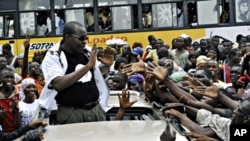As Ivory Coast prepares to hold its long-delayed presidential poll, Human Rights Watch says well-armed criminal gangs in the country's far west continue to assault, rob and rape local residents with impunity.
In a report released Friday, Human Rights Watch says in western Ivory Coast, masked bandit groups create makeshift roadblocks to then rob and attack local residents and extortion by former rebel fighters is rampant.
Root causes
The international watchdog group says the criminality has its roots in the 2002-2003 civil war that split Ivory Coast between north and south. HRW says since then, state failure to protect residents and punish attackers has fueled lawlessness.
The report focuses on the far western regions of Dix-Huit Montagnes and Moyen-Cavally, which HRW researcher, Matthew Wells, said were the hardest hit by the conflict.
"You had the influence of Liberian and Sierra Leonean former fighters who were recruited by both the rebels and the government forces," Wells said. "It was, in many ways, the focal point of the conflict, and as a result, the government supported militia forces in Moyen Cavally. The militia forces number 25,000 in Moyen Cavally alone. And so, it was a place where there were large-scale massacres. Sexual violence was widespread."
He says the situation has deteriorated from there.
Throughout rebel territory, particularly in Dix-Huit Montages, he said former rebel group, Forces Nouvelles, uses intimidation and violence to exhort bribes from people at checkpoints and local businesses. In continuing to control these checkpoints, Wells said Forces Nouvelles is in violation of the Ouagadougou peace accords.
Violence against women
Sexual violence, he said, is pervasive in the West and most cases go unreported.
"These are women who are pulled off of transport vehicles and raped en masse, twenty women raped in a single instance often by multiple men," said Wells. "We found young girls as young as seven-months-old were targeted to elderly women over 70, women who were pregnant. Really, no one is safe in the western region. That is the pervasive feeling that you get."
He said HRW found that when residents did report these, and other attacks, police at checkpoints often did nothing. Human Rights is calling on Ivorian authorities to actively investigate and prosecute these crimes.
"For the woman who needs to sell goods at market or a driver who is just trying to make ends meet, the lawlessness and the brutal violence really destroys their daily lives," he added. "They are unable to travel as they were prior to the conflict, and the extortion just adds to this both by government forces and Force Nouvelles rebels in the sense that they are constantly having to pay bribes to security forces to Forces Nouvelles to get through checkpoints. Their economic livelihood has been destroyed along with their sense of security."
Ways to re-establish rule of law
With little more than a week to go before long-delayed presidential elections, Human Rights Watch calls on candidates to address how they will re-establish the rule of law throughout the country, particularly in the west.
"In the aftermath of the conflict, while everyone has been focusing on elections, the West has remained essentially lawless," Wells said. "Because of the proliferation of guns during the conflict that have remained with failed disarmament, problems remain at near crisis levels."
He said, in the West, courthouses need to be rebuilt, judicial officials need to be sent back out, and criminals need to be held accountable.
After five years of repeated delays, Ivorians plan to go the poll on October 31st for their first presidential vote since the conflict broke out in 2002.












